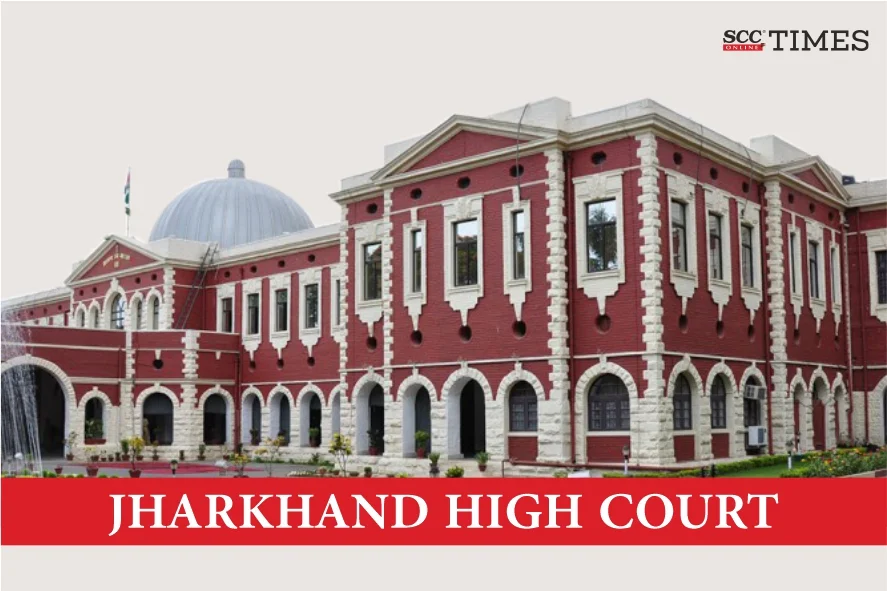Jharkhand High Court: In a present criminal contempt proceeding registered against the Advocate General and Additional Advocate General (‘respondents’), following the order passed in Bijay Kumar Agrwal v. Union of India, WPCR No. 139 of 2021, the Division Bench of Shree Chandrashekhar, ACJ* and Ambuj Nath, J., opined that without framing a charge and affording an opportunity to the respondents to explain their conduct, a reference under section 17 of the Contempt of Courts Act, 1971 (‘the Act’) for registering a criminal contempt proceeding against the respondents was not maintainable. The Court opined that this reference against respondents contravened the provisions under Section 15(3) of the Act and the rules of natural justice and therefore, was liable to be discharged.
Background
In in Bijay Kumar Agrwal v. Union of India, WPCR No. 139 of 2021, the writ petition was filed for investigating the murder of the petitioner’s daughter by the Central Bureau of Investigation. Subsequently, the judgment was delivered on 01-09-2021, and in the latter part of the judgment, the Court narrated the incident that had happened in the writ Court on 13-08-2021 and formed a prima facie opinion that the Advocate General and the Additional Advocate General had committed criminal contempt of the Court.
On 11-08-2021, the Advocate General informed the writ Court that the counsel for the writ petitioner of that case, was heard saying that “the matter was going to be allowed 200%”. On 13-08-2021, the Advocate General asked the Court not to hear the matter, and Additional Advocate General supported this statement. The writ Court took the incident seriously and asked the Advocate General to put his statement on the affidavit, but he refused to do so. Therefore, the writ Court held that there was no need to recuse from hearing the case, on a mere statement made by him. However, the writ Court thought it proper to refer the matter to the Chief Justice for a decision on the administrative side.
After reassignment of the matter to the same Judge, the writ petition was listed for further hearing on 26-08-2021 and 31-08-2021. The judgment was delivered on 1-09-2021, directing the State police to hand over the investigation to the CBI. The writ Court took cognizance of the conduct of the Advocate General and Additional Advocate General in the Court on 13-08-2021 and made a reference to register suo motu contempt proceeding against the Advocate General and Additional Advocate General.
Analysis, Law, and Decision
The Court opined that the contempt jurisdiction was inherent in all courts of record. Article 215 of the Constitution and the Act recognized and preserved the pre-existing contempt jurisdiction and powers of the court of record. The power under Article 215 of the Constitution was not restricted by any law and the only limitation was that the procedure to be followed should be fair and that the contemnor should be made aware of the charge against him and should be given a reasonable opportunity to defend himself. The Court opined that the responsibility to maintain the rule of law was equally on the members of the Bar. Any conduct designed to or suggestive of or creating unnecessary controversy in the Court would erode the public confidence in the judicial system and undermine the authority of the Court. Such attempts should be construed as an intentional attempt to obstruct the course of justice and to deter the Court from performing its duty.
The Court opined that the rules framed under Section 49(1)(c) of the Bar Council of India Act, 1961 states that an advocate must conduct himself with dignity and not be servile. An advocate had to fearlessly uphold the interest of his client by all fair and honourable means without regard to any unpleasant consequences to himself or any other. However, an advocate must exercise restraint in using intemperate language during arguments in the Court. The Court opined that the conduct of an advocate in the Court could not be like that of “the man on the top of a Clapham Omnibus” and he must maintain a respectful attitude towards the Court, bearing in mind that the dignity of the judicial office was essential for the administration of justice.
The Court noted that it was faced with a situation where the Judge did not record the words and utterances of the respondents on 13-08-2021, and a charge was not framed and put to respondents even on 01-09-2021. Thus, the Court referred to Sections 14 and 15 of the Act and inherent powers exercisable under Article 215 of the Constitution and did not accept the submission that taking cognizance of the past incident should be per se without jurisdiction. The Court opined that without framing a charge and affording an opportunity to the respondents to explain their conduct, a reference under section 17 of the Act for registering a criminal contempt proceeding against the respondents was not maintainable. The Court opined that this reference against respondents contravened the provisions under Section 15(3) of the Act and the rules of natural justice and therefore, was liable to be discharged.
[Court on its own motion v. Rajiv Ranjan, Contempt Case (Crl.) No. 3 of 2021, decided on 03-04-2024]
*Judgment authored by- Acting Chief Justice Shree Chandrashekhar
Advocates who appeared in this case:
Amicus Curiae: Vijoy Pratap Singh, Senior Advocate; Ramit Satender, Advocate;
For the Respondents: Umesh Prasad Singh, Senior Advocate; Piyush Chitresh, Advocate; Surabhi, Advocate; Ravi Prakash Mishra, Advocate.








